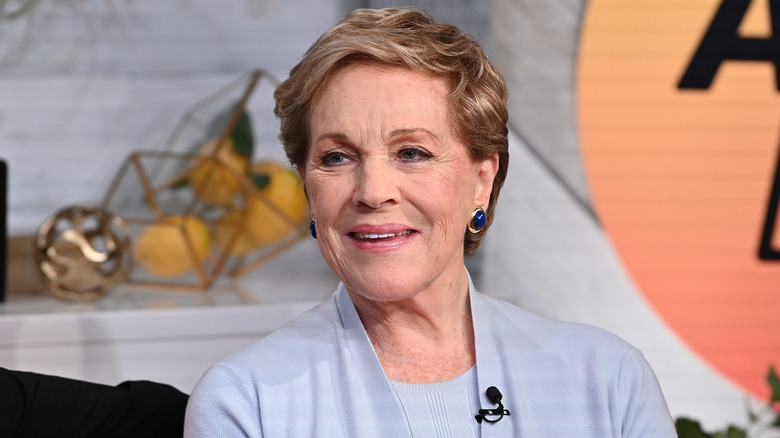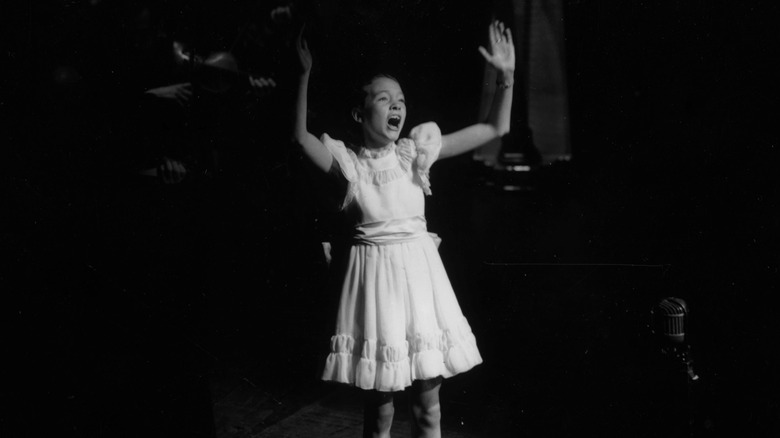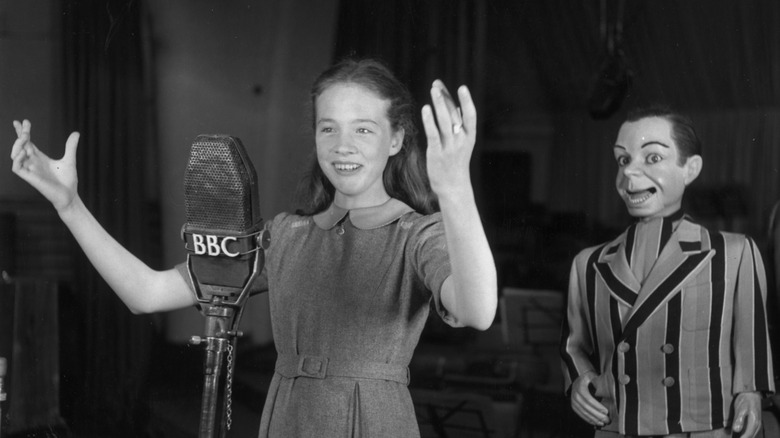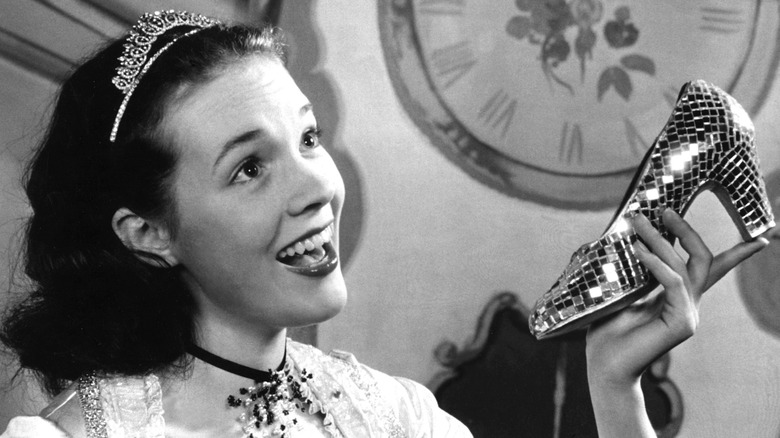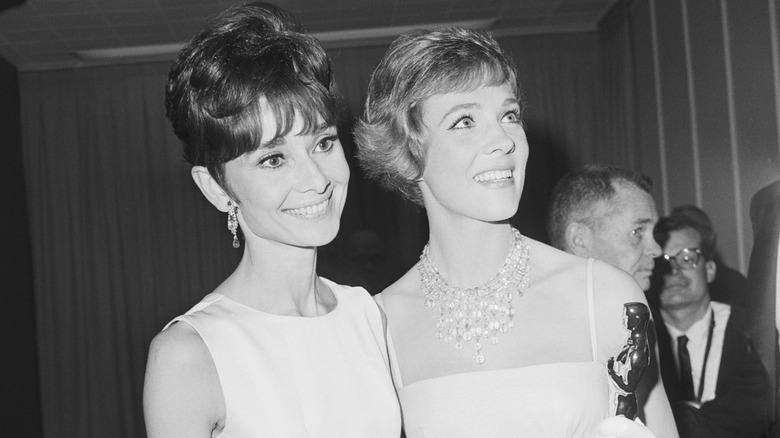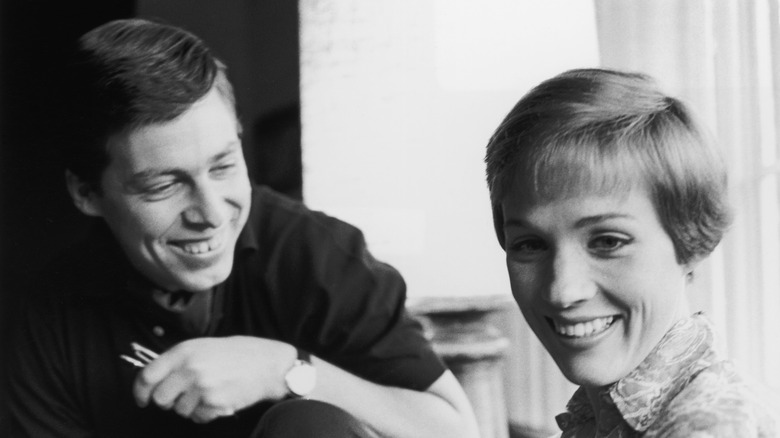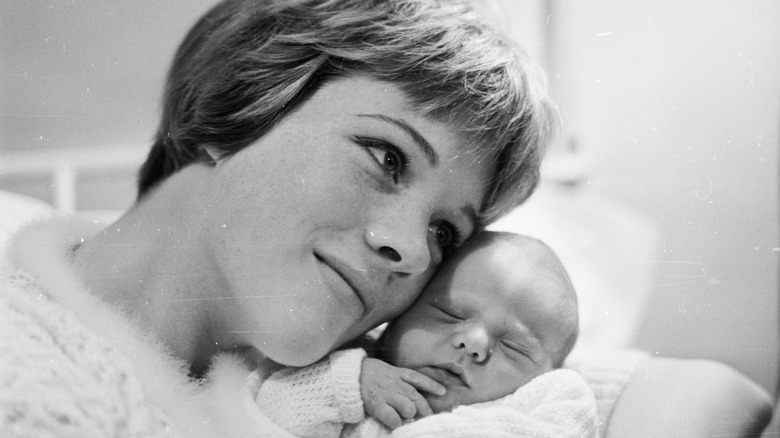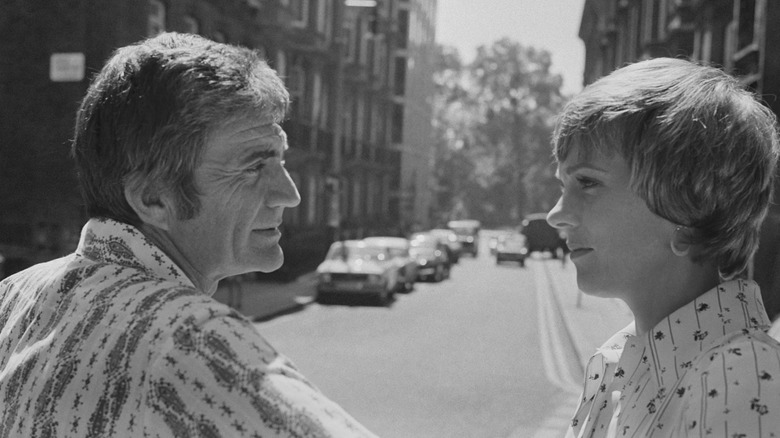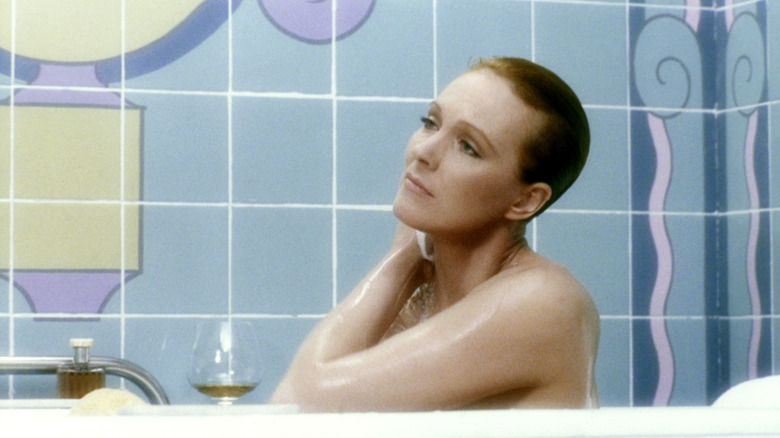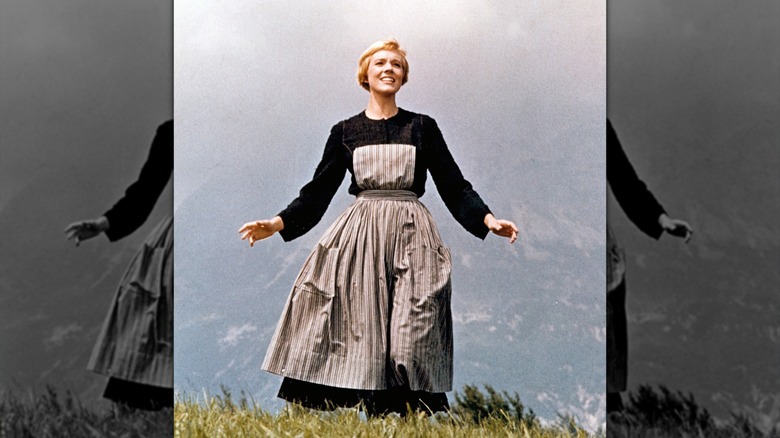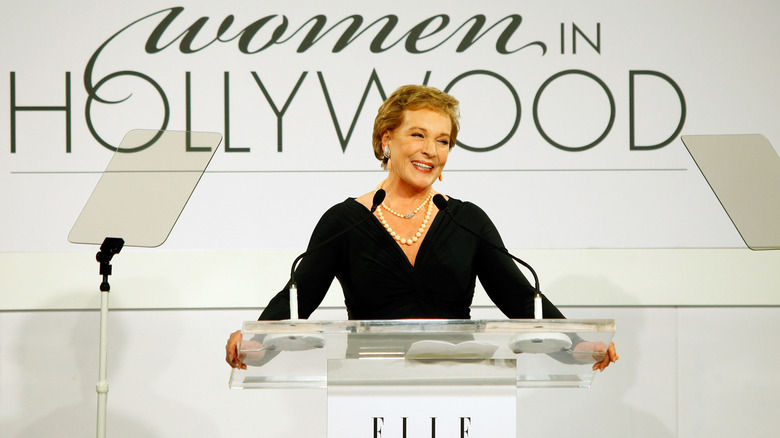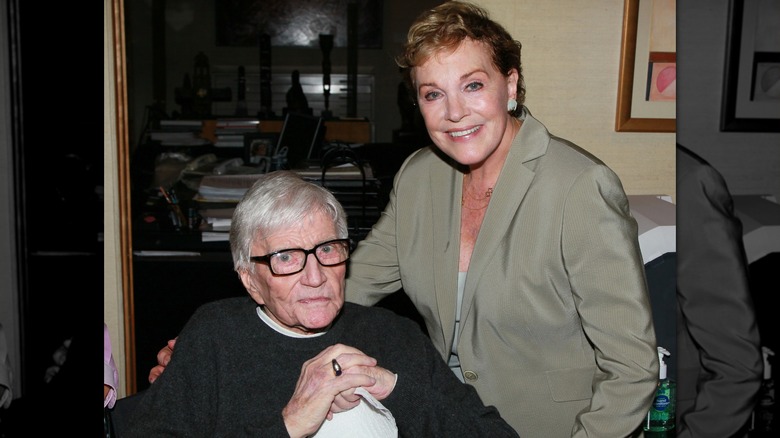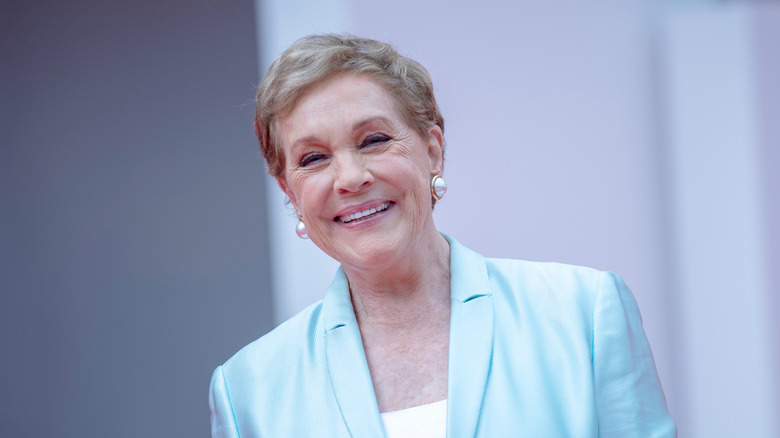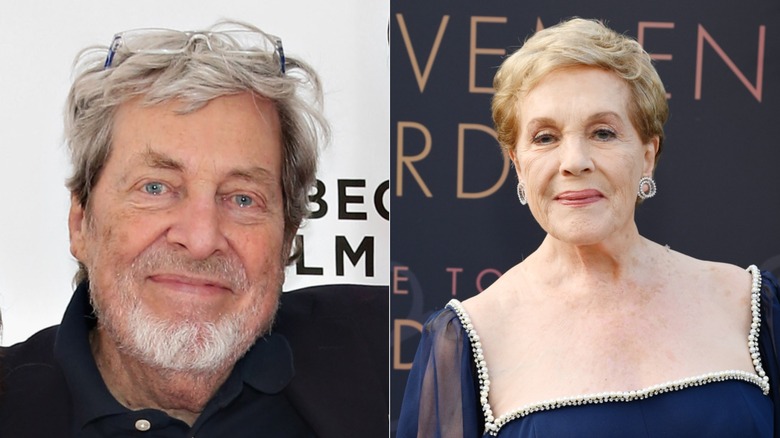Tragic Details About Julie Andrews
We may receive a commission on purchases made from links.
Julie Andrews blazes brightly as a titan within the entertainment industry, with a legacy that few other artists of her stature can match. But in the brilliance of her glow, the world often forgets that Andrews — Hollywood's enduringly pure, unblemished star of beloved classics like "Mary Poppins" and "The Sound of Music" — endured a difficult journey to get to where she is today.
After surviving a profoundly dark childhood during World War II as a child performer, who sang not just for the love of the craft but also to support her impoverished family, Andrews found her way through Broadway and eventually landed up in the ever-competitive American film industry. From there, she was exposed to a new universe of challenges. But, with a kind of grace that only Andrews could embody, the aging star seemingly refused to revel in the more unpleasant circumstances of her life. One gets an idea of it through the alarming composure and gratitude with which she has often discussed her dire childhood: "It was what it was. I mean, compared to so many other people, we were surviving," she once told CBS News. These are the tragic details from Julie Andrews' often sad yet ultimately well-lived life.
Julie Andrews grew up in a home riddled with addiction and abuse
Long before Julie Andrews was the genteel grandmother figure she is today, she was just a little girl in war-torn England, surrounded by degeneracy of all kinds. Her household was a troubled, impoverished place with complicated dynamics. Her parents, Barbara and Edward Charles Wells, divorced when Julie was very young, leaving her to flit between two families. She relished the time spent at her schoolteacher father's home: "Dad would tuck me into bed and read me a poem or a story, in his precise, beautifully modulated voice," she wrote in the memoir "Home" (via Vanity Fair). However, back at the Andrews household, an alcoholic mother and abusive stepfather awaited.
When she was only 9 years old, Julie's stepfather Ted Andrews forced himself into bed with her, saying, "I'll show you how I cuddle with Mummy." The incident came about as one of the most disturbing sequences in Julie's first memoir, second only to the time her stepfather told her when she was a teenager, "I really must teach you how to kiss properly," before planting a wildly inappropriate smooch on her lips.
The hardships of World War II didn't make things any easier
The fact that the Second World War was raging outside on the other side of the door didn't make things any easier for Julie Andrews, who spent her childhood in the throes of poverty and instability. After her parents divorced, her stepfather Ted Andrews moved the family to the slums of London and tried to keep everyone afloat with his vaudevillian grounding. Her mother, Barbara Wells, was also a skilled pianist and performed with him. Before long, Julie was pulled into the family act — in a scene that foreshadowed the legacy of the musical von Trapp family that Julie would later bring to life in the film "The Sound of Music."
A gifted singer with a brilliant four-octave range, Julie sang her way through her difficult, war-touched childhood, honing her skill through her youth on stage. "I'm so grateful that I had my voice, my singing voice, which gave me an identity, which gave me something to do when I was a child because otherwise I think I might have been a little bit at sea, a little lost," she told CBS News. By the time Andrews was in her teens, she was the primary breadwinner in her family and even paid the mortgage on their home.
She didn't know the truth about her parentage until she was a teen
Julie Andrews didn't have any reason to doubt her parentage, and for most of her youth, she lived with what she believed was a simple truth: She was the daughter of Barbara and Edward Charles Wells. It wasn't until she was a teenager that the fog lifted and reality came crashing down. Wells was not her biological father; that title belonged to someone with whom her mother had briefly shared an extramarital affair. As Andrews recalled in her first memoir "Home," the news was delivered to her 14-year-old self most unexpectedly after a performance at a family friend's house.
"After I had sung, the owner of the house approached me ... I remember feeling an electricity between us that I couldn't explain," she wrote (via Express). On the way back, Andrews' mother dropped the bomb: "That man is your father." She gently explained the circumstances of the event to Andrews, who was no doubt devastated but also determined to push past the shock. However, she clung to the image of Wells as her father and held on for life. "It did not alter the fact that the man who had raised me was the man I loved. I would always consider him my father."
She lost her original role as Eliza Doolittle to Audrey Hepburn in the 1964 film
Julie Andrews' initial claim to fame was originating the iconic role of Eliza Doolittle in "My Fair Lady" on Broadway. That she became near-synonymous with her flower girl character — having played her to perfection in the decorated 1956 production — should have prompted the industry to let Andrews herself carry the mammoth success of the musical onto the big screen. But showbiz is hardly ever a fair-playing field. So, when Warner Bros. adapted "My Fair Lady" into a film in 1964, the coveted part went not to Andrews but to the well-established star Audrey Hepburn.
Notwithstanding the spell Andrews had cast on audiences and critics, studio heads probably didn't want to bet on a newcomer over one of their most bankable names. "I had never made a movie, I was not a star, I was not box office," Andrews reflected on "The Dick Cavett Show" years after the switch-up. "I'll never forget it, but I understand it." Retrospectively, the snub probably set things in motion for a grander success story to unfold for Andrews. That same year, she made an Oscar-winning film debut as the lead in "Mary Poppins" and the rest, as they say, is history.
Pressures of work-life balance led to the breakdown of Julie Andrews' first marriage
Behind the scenes of her meteoric rise in Hollywood, Julie Andrews was struggling to keep her marriage with Tony Walton together. She had married the award-winning set designer and her longtime friend in 1959, years before she achieved mainstream stardom as a movie star, and they eventually welcomed one daughter, Emma. But walking the tightrope between a balanced home and work life proved to be difficult for Andrews, who was living from one tight film schedule to another. Walton, too, was a busy man, working in set and costume design across all mediums with titles like "Mary Poppins," "A Funny Thing Happened on the Way to the Forum," and "The Apple Tree" to his credit.
"I always hoped the two worlds could co-exist," Andrews told Business Insider in 2020. "There were times when I was more successful at it than others, and it was always an ongoing challenge." Unfortunately, the marriage could not survive the pressures of the film family's demanding lifestyles and broke down before the couple could complete a full decade together. Without any high-octane drama or bitter accusations, Andrews and Walton amicably divorced in 1968.
The divorce left her feeling like a failure
Although the separation from her first husband happened on far more graceful terms than is typical in Hollywood, Julie Andrews was left feeling hollowed out post-divorce. It was understandable, however, considering the emphasis the actor has forever placed on keeping her domestic life on par with (or even above) her professional career. "Marriage is a big up-and-down graph," she told Vanity Fair in 2019. "It's a wondrous thing, but it's probably the hardest work I've ever done, I think." So, when she divorced from Tony Walton in 1968, the blow did not come lightly.
"The worst of it was you feel such a failure because it's certainly nothing that one anticipates going into a marriage," she told Now To Love, recalling how she assumed much of the blame for the breakdown of her marriage. The circumstances didn't get any easier when her daughter Emma eventually decided to go and live with her father. Fortunately, therapy helped save Andrews' life and gave her a window into how her challenging childhood had informed her emotions as an adult. "It was a great help to me in troubled times but also in hardworking times and happy times."
Her second marriage to Blake Edwards went through turbulent phases
Shortly after her painful divorce in 1968, Julie Andrews found love again, this time with acclaimed director and screenwriter Blake Edwards. Their relationship moved fast and within a year, they tied the knot. Although the marriage would come to last four long decades, the journey toward that milestone was hardly easy. To begin with, Edwards — the genius behind cinematic watersheds like "Breakfast at Tiffany's" and "The Pink Panther" — was somewhat of a troubled soul. There was an "emotional chaos he always carried inside him," as Andrews penned in her follow-up memoir "Home Work" (via The Telegraph).
The filmmaker was given to bouts of depression, with Andrews pointing out a time in Edwards' life when he was suicidal. Simultaneously, she also tried to cope with her husband's myriad health problems that ranged from hypochondria to chronic fatigue. Then there was the matter of Edwards' ex-wife Patricia Walker, who was apparently not happy with the developments in his life and made threatening calls to the new couple's household. That said, Edwards was hardly innocent and had a roving eye that landed on the likes of actor-model Lynne Frederick. "It made me angry that this slip of a girl [was] creating so much havoc in our lives," she wrote.
Navigating the dark side of Hollywood came with its own struggles
To imagine someone like Julie Andrews, who has forever embodied a kind of innocent charm while straddling the worlds of music and magic and everything wholesome, find her way through the big, bad underbelly of Hollywood is almost jarring. But in an industry where illicit subcultures of sex and drugs are said to have reigned for decades, even flying nannies aren't spared. In her memoir "Home Work," Andrews recalled a time in the 1970s when she attended a Hollywood party with free-for-all cocaine and was being peer pressured into trying some. "The hosts began pushing me hard, curious to see how Mary Poppins would react," she wrote, thankful for having been rescued from the situation by her husband Blake Edwards.
Terrifying as the ordeal was for the clean-imaged Englishwoman, it wasn't the only industry vice she was exposed to. Andrews was well aware of casting couch incidents that transpired behind closed doors. But, as also exhibited in the story about her cocaine misadventure, her work and busy family life established something of a "protective fence" around her, as she told The Guardian. That, however, didn't stop common fears of being typecast or upsetting film bosses from seeping into Andrews' life as an artist. "It never would have occurred to me to say no to any of the things that the studio asked of me," she wrote in "Home Work" (via Business Insider).
She went into a depression after losing her iconic singing voice
Julie Andrews' soaring vocals — clear as crystal at their four-octave range — rang through Hollywood for years, enrapturing entire generations of fans, as well as studio heads who knew how to employ her musical ability for success in their films. It was a talent she had been blessed with in childhood and honed to perfection throughout her youth on stage. In 1997, Andrews underwent a routine surgery to have noncancerous nodules removed from her throat. Unfortunately, the operation did irreversible damage to her vocal range. "When I woke up from an operation to remove a cyst on my vocal cord, my singing voice was gone," she told AARP. "I went into a depression. It felt like I'd lost my identity." While she expressed joy at having found an alternative interest in children's writing, she did make the heartbreaking confession that she missed singing.
A devastated Andrews, for whom "singing was the most important thing of all," moved to sue the doctors at New York's Mount Sinai Hospital who were responsible for the surgery. The 1999 malpractice lawsuit claimed that the actor had not been intimated in advance about the permanent vocal risks the procedure carried, CBS News reported. Although the case was settled the following year and Andrews was compensated, her original singing voice never returned.
Insecurity has hounded Julie Andrews her whole life
One of the greatest ironies of being a cinema giant the size of Julie Andrews is that the feeling of not being good enough never really goes away. For all the glittering achievements she has won in her nearly 80-year-long career, Andrews has admitted to spending a considerable part of her life in self-doubt and insecurity. The overwhelm of that imposter feeling goes back all the way to 1964, when she was pushed into the throes of fame after a smashing debut in "Mary Poppins." As she recalled in her memoir, "I was a small-town English girl, naïve, undereducated, and considerably younger than my years, suddenly confronted by a scrutiny that I had no context or experience with which to manage ... I floundered about, trying to appear sophisticated, while feeling as though I were playing dress-up in my mother's clothes."
The fact that audiences absolutely adored her did little to quell Andrews' suspicion that she might be boring them. Later in therapy, she was able to trace her misgivings back to her childhood, when her mother told her, "Don't you dare think you're the best" (via Glamour). Slowly but surely, she did finally reach a point where she could proudly say, "The body of work that I've done speaks for itself."
Blake Edwards' death in 2010 left her heartbroken
Julie Andrews' world came crashing down in 2010 with the death of her husband Blake Edwards. The legendary filmmaker, 88 at the time, had been battling complications from pneumonia. In all the obituaries hailing him as one of the greatest comedy directors Hollywood had ever seen, Edwards' four-decade-long marriage to Andrews was unavoidably highlighted as one of the standout features of his legacy as a whole. Gracefully navigating their way through personal hardships and film graphs for over 40 years together, Andrews and Edwards had forged one of the strongest partnerships in the industry.
Edwards' death seemed to have marked a slowdown in Andrews' already decelerating film career, and the "Mary Poppins" star all but retreated from mainstream screen work after 2010. It was almost a decade later, when Andrews released her 2019 memoir "Home Work" and re-engaged with her lost celebrity status in a big way, that the world received a clearer picture of her grief over losing her husband. "Blake was the most charismatic, mercurial gentleman I'd ever encountered," she told Oprah Daily. "Today when I reflect on him, I still miss him so dreadfully ... it was all this wild roller-coaster ride."
Health issues compelled Julie Andrews to turn down some major film offers
There came a point when the world stopped hearing from Julie Andrews in the way it did during the peak of her stardom. This shift was not just the result of Andrews' own changing priorities and personal tragedies, nor did it stem from a lack of worthwhile opportunities — far from it. In fact, even as she slowed her showbiz career down, some of Hollywood's biggest names continued to seek her out. Unfortunately, the reason you don't hear from Andrews anymore is largely due to her health, which doesn't always allow her to take up acting work as enthusiastically as she might have liked to.
One such offer, which could have translated into a decidedly intriguing performance, came from Martin Scorsese when he was directing "The Wolf of Wall Street." Andrews was apparently up for the role of Aunt Emma, best remembered for sharing a scandalous kiss in the park with Leonardo DiCaprio's Jordan Belfort. Andrews passed up on the role in "The Wolf of Wall Street" due to a bad ankle, and the part ultimately went to Joanna Lumley. "I was finding it very hard to walk and I didn't like what I saw for the future," she told Birmingham Live in reference to longtime issues with her foot. Thankfully, she underwent a life-changing surgery and came out on the other side with a titanium ankle.
She mourned the death of her first husband in 2022
Julie Andrews met her first husband Tony Walton when she was a child, and she always maintained a dignified stance on their lifelong friendship. It is with that same thoughtfulness that she mourned his tragic death in 2022. Walton, who enjoyed a decorated career in showbiz and was only a Grammy short of being an EGOT winner, died following complications from a stroke in New York at the age of 87. "Tony was my dearest and oldest friend ... I will miss him more than I can say," Andrews told People in a heartwarming tribute to her ex-husband, with whom she shares daughter Emma Walton Hamilton.
Andrews and Walton knew each other as kids in England, and so robust was their friendship that neither marriage nor divorce could temper it. Although they moved on with their lives and built different families after parting ways in 1968, they remained close till Walton's death. Beyond their friendship, the two had also enjoyed a reputation in the industry as a formidable creative duo, having created magic together on beloved projects like "Mary Poppins" and several children's books.
